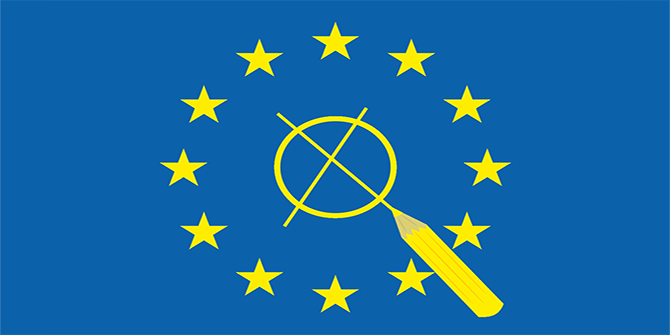 While the UK is weaker than the EU on key metrics of bargaining power, the British approach to the Brexit negotiations has been characterised by hard bargaining. Benjamin Martill writes that a number of cultural factors have influenced the UK’s decision to adopt such a sub‐optimal strategy, including the country’s weak socialisation into the EU, overstated perceptions of its own capabilities, the prevailing conservative political ideology, and a longstanding preference for ‘divide and rule’ diplomatic strategies.
While the UK is weaker than the EU on key metrics of bargaining power, the British approach to the Brexit negotiations has been characterised by hard bargaining. Benjamin Martill writes that a number of cultural factors have influenced the UK’s decision to adopt such a sub‐optimal strategy, including the country’s weak socialisation into the EU, overstated perceptions of its own capabilities, the prevailing conservative political ideology, and a longstanding preference for ‘divide and rule’ diplomatic strategies.
Whatever else it is known for, Theresa May’s brief tenure as prime minister will forever be associated with her failure to deliver Brexit. One of the reasons May struggled to negotiate a Withdrawal Agreement, I argued – in research conducted with Uta Staiger at the UCL European Institute – was the prime minister’s emphasis on ‘hard bargaining’ in the negotiations. While many metrics of hard bargaining are available, May’s approach seemed to approximate aspects of several of these: strict ‘red lines’ were drawn prior to the negotiations beginning, British demands were highly unreasonable given the EU’s position, frequent threats to exit the talks were issued (some of which involved threats of economic deregulation also), and concessions were portrayed to audiences in the UK as a sign of failure.
Hard bargaining is usually the preserve of the more powerful actor, which can afford to push its weight around. But in the case of the Brexit negotiations, it is the EU27 which holds all the cards, not the UK. This didn’t just make British hard bargaining surprising, it also made it inappropriate, since it was the UK which needed a deal the most, and Brussels which would likely set the terms and red lines. We suggested in our research that hard bargaining undermined the negotiations in a number of respects. It introduced inflexibilities right from the get-go which made it difficult to introduce workable proposals or identify mutually beneficial trade-offs and it reduced the level of trust in the relationship, pushing Brussels to consider even more rigorous safeguards aimed at preventing British defection.
At home, May’s hard bargaining arguably made the ratification of the Withdrawal Agreement more difficult, since it raised expectations about the kind of deal the UK would be offered, leading many to conclude that the resulting deal did not live up to what they had been promised. It also arguably encouraged support within the Conservative party for ‘no deal’ Brexit as an option, since no deal planning and a willingness to walk away from the table were key components of May’s strategy. Prior to the eventual (and unprecedented) series of defeats of her agreement in early 2019 (on 15 January, 12 March and 29 March), May was left facing a cadre of individuals in her own party who felt the deal was insufficient, many of whom weren’t afraid of crashing out of the Union. Without their support, May’s plan for a Conservative Brexit was doomed.
But it would appear hard bargaining dies hard. Boris Johnson has, if anything, adopted an even harder strategy than his predecessor. Johnson won the Conservative leadership election on the basis of his willingness to support a no-deal Brexit, and one of his first actions in office was to step-up no-deal preparation, with an accompanying public-facing ad campaign warning UK citizens and firms to prepare for this outcome. The attempted prorogation of Parliament, deemed unlawful by the Supreme Court, was designed to prevent Parliament from acting on its earlier commitment to preclude this outcome.
And, as the talks have moved on to the future relationship, it seems history is repeating itself. Another cliff-edge looms in December 2020 when the transition period expires and when, if a deal is not agreed, the UK will crash out of the single market and customs union. Johnson continues to warn the UK is prepared for a no-deal Brexit if concessions from the EU are not forthcoming and has, by all accounts, attempted to try to subvert the Commission-led negotiations by reaching out to the individual member-states, a continuation of May’s wholly unsuccessful efforts to ‘divide-and-rule’ by cutting side deals with individual member states.
In the past few months, Johnson has upped the ante by introducing legislation which would, if implemented, be in contravention of commitments made in the Withdrawal Agreement which he himself (re-)negotiated. The Internal Market Bill has, in consequence, led to a series of resignations from senior civil servants concerned they would find themselves in contravention of the law, and has prompted the EU to begin infringement proceedings against the UK.
Why does the UK persist with a hard bargaining strategy that appears ill-suited to the UK’s power position and which, thus far, has not brought demonstrable results? One reason lies in some of the pervasive misperceptions about the EU and the Brexit negotiations which took hold in the upper echelons of the Conservative Party in those months when key decisions were made. These included the idea that EU unity would not last, that the EU would be willing to offer the UK a bespoke deal, that the appeals of German car manufacturers would be well represented in the EU’s portfolios of interests, and that the EU27 would prioritise economic resilience over and above core values. Each of these assumptions proved to be false, and each pushed in the direction of hard bargaining.
Another possible explanation can be found in the domestic political circumstances of Brexit. As former Permanent Representative Sir Ivan Rogers has argued, Brexit ushered in a revolutionary moment at home in which positions among Remain and Leave supporters tended towards the extremes, because seemingly everything was still to play for. The underlying shift of support among Brexit supporters towards an embrace of ‘no deal’, or a harder Brexit, has made it more difficult for leaders to ‘sell’ compromise positions to their own party. They must continue to perform hard bargaining lest they find themselves deposed by the Eurosceptics. Johnson’s ascendence in the party owed much to these very forces, which he sought to cultivate as a member of May’s Cabinet and to which he owes both his selection as Conservative leader and his 80-seat majority from the 2019 general election.
Finally, our research suggests there are longer-term factors at play in the UK, and especially within the Conservative Party, which point towards the adoption of hard bargaining vis-à-vis the EU. One is the persistent over-estimation of UK capabilities and the belief that Britain, as a great power, will naturally be in the driving seat when it comes to negotiations in Europe. This taps into broader complacency about the UK’s credentials as a power, but it also draws upon now ill-fitting analogies with previous EU-level negotiations in which the UK has succeeded in obtaining substantial concessions from Brussels. Of course, as many have pointed out, these examples are moot, since EU negotiations look very different as a third country than they do as a member.
One way of thinking about British hard bargaining is that it is over-determined. Conservative Party politics, assumptions about the EU, and conceptions of UK identity and history all push in the direction of a fundamentally ill-suited bargaining strategy. This is unlikely to change, but also unlikely to produce any great success, given the EU’s bargaining power and its incentives not to yield to British demands. Like a scolded child whose only response is escalation, the UK will keep lashing out until presented with the final deal Brussels is prepared to countenance. And then, with Johnson as with May, the focus will shift to “selling” a sub-par outcome at home.
___________________
Note: the above draws on the author’s co-authored article in the Journal of Common Market Studies (JCMS).
 Benjamin Martill is Lecturer in Politics and International Relations at the University of Edinburgh.
Benjamin Martill is Lecturer in Politics and International Relations at the University of Edinburgh.
Photo by Étienne Godiard on Unsplash.








I entirely agree but as such a frenzy was whipped up by both the Conservative Party and the mainstream media, both for their narrow self interests, they have boxed themselves into a corner and can no longer control the beast that they have released. Don’t forget that the Brexit referendum was only permitted by Cameron as a very lazy way of dealing with internal politics and preventing a schism but has only really plastered over the problem as will become all too obvious when the tariffs bite in the new year. By then the damage inflicted on the nation by Johnson’s Brexit will be undeniable and their main strategy will be shifting the blame onto the COVID-19 pandemic, still they will have achieved their goal of removing the protections for citizens that came with membership of the EU.
I really enjoyed reading your article and Fintan O’Tooles book on Brexit sprang to mind.
It feels as if the English Conservatives are living in another time, in another century which is illuminated by some ‘glorious war’.
Their wars are always ‘glorious’ and always have ‘heroes’ – of course those heroes are Conservatives themselves – and sacrifices have to be made – of course by ‘others’ often the poorer the worthless ones.
This ‘glorious war’ idea is also part of the Brexit negotiations because the EU is now the ‘enemy’.
These, mostly older, men are willing – not to die- but to ‘lie’ ‘for their ‘glorious war’ which is playing such an active role in their public school minds.
It might be schoolboy wargames which still gives them a childish pleasure?